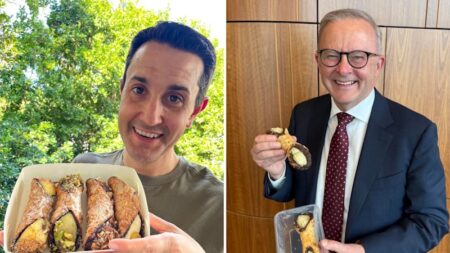“But I guess it was like, how people on the internet feel versus how I feel.”
Ellis says what really shattered his streak was a car park painting job in Melbourne that demanded long overnight hours – which is how he ended up settling for an all-hours kebab store on September 4.
When he lost track of time the following day and faced the same dilemma, he simply accepted his fate.
“I thought, I just don’t have the free time to appease people with my silly chicken eating right now. And then once I’d missed the day I was like, oh, I’ve failed.”
He had also become resigned to the fact his initial endeavour to drum up support for his art business hadn’t gone to plan.
“I hoped people would find my chicken page and be interested in who I am as a person, and then find out I do this,” he says, pointing to a mural he’s working on in Brisbane’s Fortitude Valley.
“But it didn’t pan out that way at all.”
Ellis insists he suffered no unexpected health consequences from eating nearly 250 roast chickens. But he admits he took a loose approach to his diet after the first few months.
“I’d call it heavily unbalanced,” he says.
“I saw some weight loss in the first month because I’d eat the chicken, and I’d feel full all day.
“But then after a month, my body went, ‘You know, you can eat a cheeseburger as well, and maybe get a pie on the way home, too.’
“It wasn’t like I was going, ‘Oh you know what, I’ve had my chicken, I really want vegetables now. I’m craving a fruit salad’ … I’m certainly not a health-conscious guy.”
Loading
At the start of the challenge, at least one health professional warned the chicken-centric diet could put Ellis at risk of developing scurvy, a disease caused by vitamin C deficiency.
Others worried about additives such as thickeners and flavourings in supermarket roast chickens.
But Griffith University nutrition and dietetics expert Professor Ben Desbrow says there’s “nothing too sinister” hiding in roast chicken.
“You don’t have to worry about hormones or steroids being injected,” he says, although he does caution against persisting with diets that lack variety.
“One of the beautiful things about the way your body works is that it handles nutritional variety pretty well,” he explains.
“If you miss [certain nutrients] one day, it often has storage capacity and a tolerance to being able to adapt and overcome those daily fluctuations.
“But if you remove the fluctuations from the food that you’re eating and eat the same thing repeatedly, that’s when you’re likely to get exposed to oversupply of certain nutrients and a deficiency of others. Both of those things could be a problem.”
Desbrow says certain people can survive on restrictive diets for long periods.
He says some of the “greatest discoveries in nutrition have come from self-experimentation” – people abstaining from foods to study their effects – but warns there are also cases of “nutritional martyrs” who died because of their extreme food intakes.
Loading
So, after nearly 250 roast chickens, which tasted the best?
“Sizzling Birds in Wishart,” Ellis says without hestitation. “They’re just excellent at what they do.
“Old mate who’s the boss, he’s the man, he’s just a real, authentic, genuine guy. He really cares about putting out a quality product, and they consistently [do that].
“It’s a league ahead of everything else I’ve tried.”
Read the full article here

















